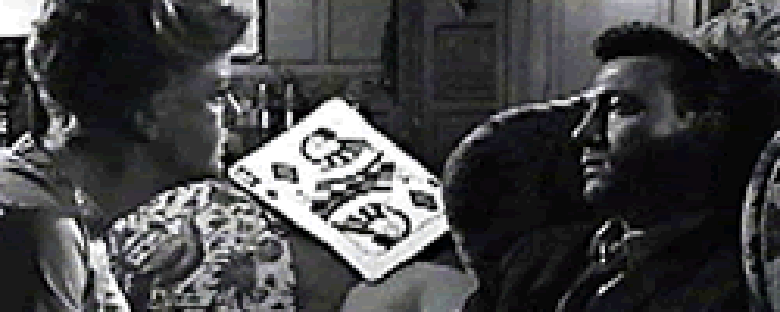Reviews
John Frankenheimer
USA, 1962
Credits
Review by Rumsey Taylor
Posted on 11 July 2004
Source MGM/UA VHS; 35mm print
Related articles
Reviews: The Manchurian Candidate
“Raymond Shaw is the kindest, bravest, warmest, most wonderful human being I’ve ever met in my life.”
This line, noticeably repeated in The Manchurian Candidate, becomes further contradictory with each utterance it receives. At first it seems befitting, as it describes a man receiving the Medal of Honor for his examples of courage in the Korean War. Later, however, we learn Raymond Shaw is a helpless pawn for communist leaders; his redundantly cited traits therefore become decreasingly apt. Raymond Shaw is an assassin, guilty of killing two of the men in his platoon — a violence he has no knowledge of.
An enormous feat of irony distinguishes the controversial history of The Manchurian Candidate: the film was based upon a Richard Condon novel and culminates in a political assassination. During production, due to Frank Sinatra’s suggestion, John F. Kennedy phoned Arthur Krimm (president of the film’s distributor, United Artists, and Finance Chairman for the democratic party) and admitted he had no trouble with the film or its subject matter.
The film opened to unanimous raves, and within the following year the President was shot. Due in no small part to the death that coincides with its content, The Manchurian Candidate is resultantly a foremost example of art imitating life — a claim realized as the film was subsequently shelved and distributed in no form until 1988 (this “self-banning” was an action made out of sensitivity). This tenure of absence has not stifled its collective regard as an American classic.
The film is a political (or, justifiably, antipolitical) thriller; lying, cheating, and betrayal are only some of the more apparent disreputable traits the main characters possess, two of which are campaigning politicians.
The film opens in Korea, 1952. A group of American soldiers are collected and embark towards a midnight horizon. They are captured shortly thereafter.
Months later, the war is over. Raymond Shaw, commander of the captured soldiers, is to receive the Medal of Honor. He is the stepson to Senator John Iselin, who is campaigning for Vice President.
In a concurrent action, two men in Shaw’s troupe share a recurring nightmare. Their dream is told in a fantastic sequence: Shaw is flanked by his team, and they sit in front of a group of women during a “Fun With Hydrangeas” lecture. In an uninterrupted pan, the camera tracks 360 degrees, from the soldiers, to the listening women, and back around to the soldiers — now surrounded by Korean generals and posters of Communist leaders. The soldiers have been brainwashed; the lecture is what they are told to see, the generals inhabit reality.
The Korean general commands Shaw to strangle one of his men. He does, and the others in his platoon yawn with nonchalant disregard — they are not conditioned to perceive the violence before them. Afterwards, he is told to shoot another.
Both men who have this dream (neither is in direct contact with the other) immediately attempt to contact Shaw. One, Ben Marco (Sinatra), boards a train towards Washington; the other, Al Melvin, writes a letter. Shaw receives the letter, and in the middle of reading it answers a ringing phone. “Raymond, why don’t you pass the time by playing a little solitaire?” a quiet voice sounds. He does. Upon arriving at the Queen of Diamonds Raymond is hypnotized and awaits his orders.
Raymond has become a tool for Communist leaders attempting to infiltrate American democracy. He is the perfect killer: willing at a moment’s notice, devoid of any guilt, and incapable of remembering his crimes.
Viewing the film some forty years following its initial controversy, the film forwards an uncompromisingly cynical (and unexpectedly modern) perception of politics. In the film’s established context politics is a plague, as bystanders and otherwise innocent individuals are robbed of the most basic American freedoms. The shadow of Communism is impetuously threatening.
The Manchurian Candidate is impeccably designed. To say the film involves twists does not accurately measure the intricacy of its plot; it is a thick brush of narrative directions. To mind, no political thriller gathers greater momentum and yet steers towards more impossible turns, arriving at a truly astonishing finale.
The film is rich with subtext: the plot is forwarded on televisions and newspaper headlines, political icons and emblems. Throughout its periphery images of Abraham Lincoln recur — there is a bust, a painting, and Senator Iselin’s costume at a party; each foreshadows the desired assassination by Raymond’s secret American Operator.
Considering its many aims, the film is a library of thematic successes. It is Cold War paranoia; it is a satire of political etiquette; it contains elements of romance, horror, and procedural crime thrillers; The Manchurian Candidate is at once brutally intelligent and shocking. Long after the final gunshot segues to pounding thunder, the impression of the film’s climax fades like a slowly healing wound.
We don’t do comments anymore, but you may contact us here or find us on Twitter or Facebook.



